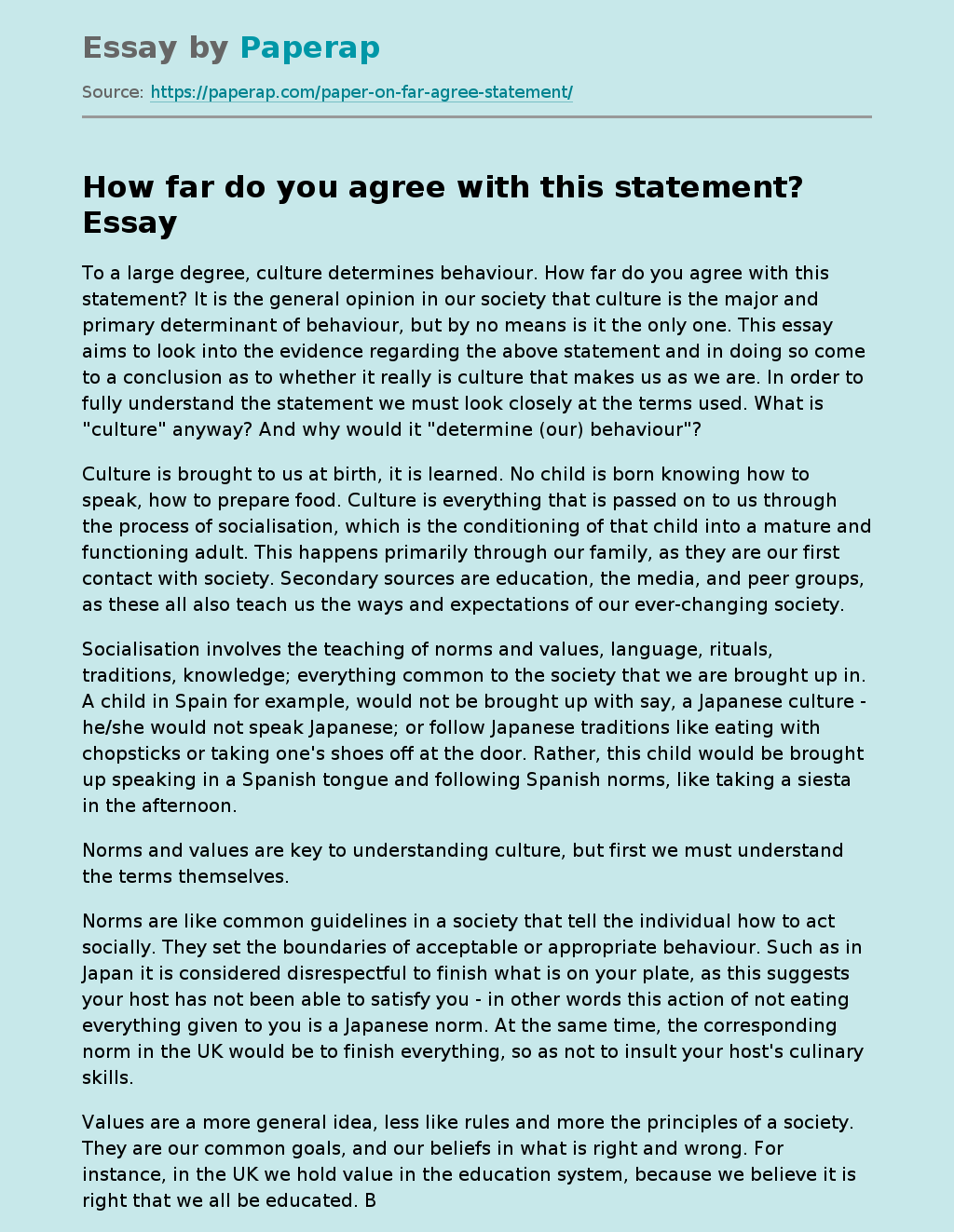How far do you agree with this statement?
To a large degree, culture determines behaviour. How far do you agree with this statement? It is the general opinion in our society that culture is the major and primary determinant of behaviour, but by no means is it the only one. This essay aims to look into the evidence regarding the above statement and in doing so come to a conclusion as to whether it really is culture that makes us as we are. In order to fully understand the statement we must look closely at the terms used.
What is “culture” anyway? And why would it “determine (our) behaviour”?
Culture is brought to us at birth, it is learned. No child is born knowing how to speak, how to prepare food. Culture is everything that is passed on to us through the process of socialisation, which is the conditioning of that child into a mature and functioning adult. This happens primarily through our family, as they are our first contact with society.
Secondary sources are education, the media, and peer groups, as these all also teach us the ways and expectations of our ever-changing society.
Socialisation involves the teaching of norms and values, language, rituals, traditions, knowledge; everything common to the society that we are brought up in. A child in Spain for example, would not be brought up with say, a Japanese culture – he/she would not speak Japanese; or follow Japanese traditions like eating with chopsticks or taking one’s shoes off at the door. Rather, this child would be brought up speaking in a Spanish tongue and following Spanish norms, like taking a siesta in the afternoon.
Norms and values are key to understanding culture, but first we must understand the terms themselves.
Norms are like common guidelines in a society that tell the individual how to act socially. They set the boundaries of acceptable or appropriate behaviour. Such as in Japan it is considered disrespectful to finish what is on your plate, as this suggests your host has not been able to satisfy you – in other words this action of not eating everything given to you is a Japanese norm. At the same time, the corresponding norm in the UK would be to finish everything, so as not to insult your host’s culinary skills.
Values are a more general idea, less like rules and more the principles of a society. They are our common goals, and our beliefs in what is right and wrong. For instance, in the UK we hold value in the education system, because we believe it is right that we all be educated. But in some societies education is of no value as families need children to work and bring home money for food.
So basically, our culture is determined upon that which we are surrounded by from birth, what we are submersed in. We are taught how to be: how to communicate, how to act, how to eat, drink, sleep, live. So would it be fair to say that the culture we are brought up in determines our behaviour?
Let us look at the example of “Clare”, a neglected child. She was found at five years old, locked in a stinking room in appalling conditions, having obviously been left alone by uncompassionate parents. She still wore a nappy, and after being taken into care, continued to soil it up to seventeen times a day. She had little speech capability and did not understand that her actions (such as smearing faeces on people) were not socially acceptable. And yet within only a few months of going into foster care, she no longer needed nappies and was progressing well with speech and learning. A year later, and Clare was socialised enough to go to school and interact with other children.
This article, published in 1998 by the Sunday Times Magazine, shows the effect to the child of a lack of socialisation and culture. Without being immersed in a language, we cannot speak; without being surrounded by people, we cannot interact with “proper” accord. To this end it can be suggested that our behaviour stems almost absolutely from culture, as without it we would be likened to Clare, almost animal-like. Basically we would be reverting to our cave-man roots, before humans got together to form societies and instead bashed each other over the head with clubs.
That is not to say that the scientists are all wrong, and that our behaviour has nothing to do with our genes. It is widely accepted that genes account for certain behaviour among people. As humans we are all born with instincts and robot functions, though many have been lost due to over-socialisation and evolution. An example is our drive to reproduce; most people now accept that a female will be more attracted to a stronger looking man when she is fertile and a more caring looking man when she is not. Another example would be the deviance gene which is said to define whether a person is more likely to be a criminal or not.
It is my opinion that to a large but not total degree, culture does determine behaviour. Culture shapes us into the individuals we become until we are old enough to evaluate our own thoughts and come to our own conclusions. Sometimes we form our own sub-cultures, away from the norm, and in doing so rebel against our culture. But this would never have happened if we had grown up without a culture in the first place, like Clare. Cultural diversity is a major issue in the world today, what with the topics of racism and terrorism always in the newspapers, and until we understand every culture and sub-culture, we will never begin to understand the behaviour of their members.
How far do you agree with this statement?. (2017, Dec 20). Retrieved from https://paperap.com/paper-on-far-agree-statement/

